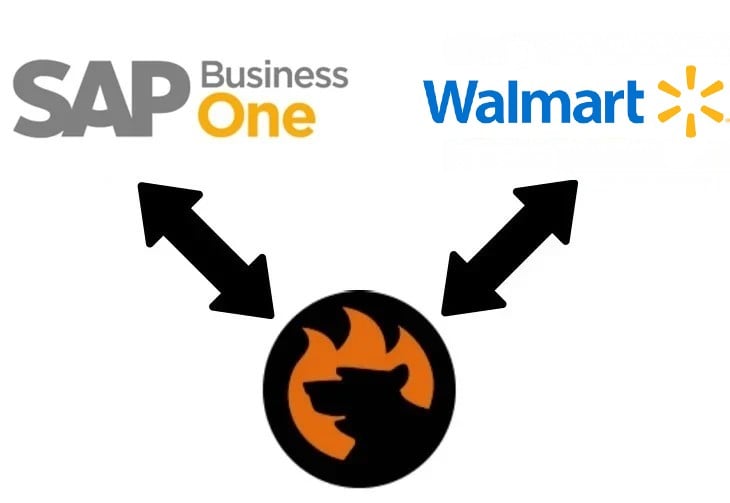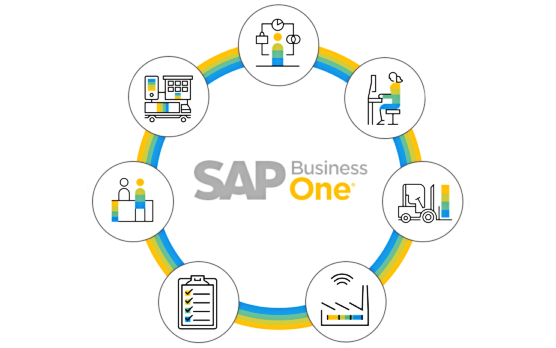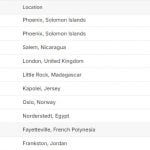SAP Business One Integration with Walmart Seller Central
You can sufficiently improve your daily business processes with the help of modern e-commerce instruments, such as ERP systems, CRM platforms, and accounting tools. Both small and big market players can get the most in-depth insights and automate their daily workflows. In the following article, we talk about one of the most rugged and feature-rich ERP systems – SAP Business One. But you may ask how to streamline this complicated machine on a small store that runs on top of the Walmart marketplace? You need to run the SAP Business One Walmart Seller Central integration. Although it may seem frightening at first sight, there is nothing to be afraid of. The SAP Business One Walmart integration is nothing to worry about if you work with the Firebear team. We will help you tame the beast. Our team creates and maintains the SAP Business One and Walmart Seller Central connector that not only automates essential business functions but also facilitates your operational data efficiently.

Keep in mind that you can integrate Sap Business One with lots of different platforms and Firebear Studio will kindly help you do that. Contact us following the link below to get more information:
Table of contents
SAP Business One Defined
If you are not aware of SAP Business One, you will find its brief description below. SAP B1 is a company management software solution aimed at enterprise resource planning. Although it was initially planned for small and medium-sized firms, SAP B1 is suitable for some big companies too. Its key goal is to automate numerous business functions in all possible areas, simplifying your daily obligations associated with financials, operations, and human resources.
SAP Business One incorporates 15 functional modules to cover multiple different areas of your enterprise:
- Administration. Here, the setup of various basic settings takes place.
- CRM. In this module, you can share everyday sales employee tasks with other modules.
- Financials. You can use this module to define the Chart of Accounts and create Journal Entries.
- Opportunities. SAP B1 uses this module to generate leads to let you keep track of potential Sales and Purchases.
- Sales – A/R. Here, you can manage the sales flow that starts as Quotation and proceeds to Order, becoming Delivery, and then AR Invoice.
- Purchasing – A/P. This module is responsible for the purchase flow. It starts from Quotation and proceeds to Order, GRPO, and AP Invoice.
- Business Partners. Master data of Leads, Customers, and Suppliers is stored here.
- Banking. You can use this module to create Incoming (sales) and Outgoing (purchase) payments.
- Inventory. SAP Business One stores master data of sold/purchased goods along with their quantity/value in warehouses is available here.
- Resources. In this module, you can define where master data of resources (machines and people) should be used in production (capacity and planning).
- Production. Maintain Bill of Materials master data and create Production orders here.
- Project Management. SAP Business One provides lets you define projects in this module.
- Material Requirements Planning. Forecasts of needed items in sales/production are available in the MRP module. It also provides purchase order recommendations.
- Service. It is possible to maintain service contract management and create service calls in this module.
- Human Resources. Employee master data is stored here, including names, contact information, roles, etc.
Although each module addresses specific business challenges on its own, they are tightly connected with one another. In addition to this inner synchronization, you also need to tie an outer source of information to water your ERP system with precious data. And your Walmart Seller Central account is a perfect contender for that role. every module with the corresponding part of your Walmart Seller Central facility.
You can find more information on the prominent ERP system here: SAP Business One In-Depth Review.
Walmart Seller Central Defined
Walmart introduces lots of opportunities for different categories of people, including online merchants. Unlike most e-commerce platforms that require much more time and effort to launch a storefront, Walmart provides a user-friendly admin experience through its Seller Central interface, introducing the opportunity to get a fully-featured e-commerce outlet connected to millions of customers. So, what is Walmart? What is its Seller Central?
Walmart Inc. is an American multinational retail corporation that operates a chain of hypermarkets. Also, it is associated with, discount department stores, grocery stores, retail warehouses, and online marketplace. As of April 30, 2022, Walmart:
- has 10,585 stores in 24 countries;
- is the world’s largest company by revenue, with about US$570 billion in annual revenue;
- is also the largest private employer in the world with 2.2 million employees.
As for the , it operates much like Walmart itself. However, third-party sellers can list their products and services on the website. The marketplace is easy to navigate, has comprehensive information in product listings, looks great, and makes an overall positive impression. As a merchant, you only need to send your inventory to Walmart and let them take care of the rest. How to send goods and services to the website? , and we will help you to transfer them into the system.
If you still don’t know what products to sell on the Walmart marketplace, let’s identify them. Note that you will need to conduct market research to create the most profitable offers. Think about the following qualities:
- Relatively high margins;
- Low or moderate competition;
- Small and lightweight products;
- Steady demand throughout the year;
- Selling 10+ items per day is also great.
So, these are general recommendations for your first attempts to tame Walmart. And these are core advantages of the marketplace:
- No monthly fees;
- Relatively low competition;
- One of the largest consumer bases in the world;
- Better conversions with two-day shipping that doesn’t charge the fees associated with Amazon Prime;
- Robust ads to reach your audience.
At the same time, it is necessary to keep in mind that Walmart Seller Center provides very specific rules on eligibility for products. You need to follow these rules to become a Walmart Marketplace seller:
- Businesses registered in the U.S.;
- U.S. address for your warehouse(s);
- A DUNS number for merchants who are outside of the U.S.;
- Good reviews of your products elsewhere;
- Your products should fit into one of the company’s categories;
- Competitively priced products.
However, if you are already an experienced seller, you should know all these facts and might have got bored, waiting for the main piece – SAP Business One & Walmart Seller Central Integration.
SAP Business One Walmart Integration
Now, when you are familiar with the core advantages of SAP Business One and Walmart Seller Central, we’d like to draw your attention to their connection. Remember that you can integrate Sap Business One with Walmart Seller Central with the help of the Firebear Studio. Our specialists will kindly help you do that. Contact us following the link below to get more information:
Customers
We can help you sync customers between SAP Business One and Walmart Seller Central. Note that we transfer all customer details, including info on all the associated orders.
Items
All products can be synchronized too. We can transfer items from Item Master Data of SAP Business One to Walmart Seller Central directly and vice versa. As for item attributes, they are automatically updated whenever a change occurs in either SAP Business One or Walmart Seller Central.
Product prices are also updated from SAP Business One to Walmart Seller Central and vice versa, including Special Prices and Promotional prices. The same is about pricelists: our team can help you manage them whenever a change occurs or a new pricelist is introduced, delivering tight SAP Business One and Walmart Seller Central Integration.
Invoices
Our integration syncs Invoices and Payments from Walmart Seller Central to SAP Business One on specific Order Status.
Orders
The Firebear team can help you synchronize Walmart Seller Central orders to SAP Business One and keep them there as Sales Orders along with order information like Taxes, Shipping Charges, Line Items, Discounts, etc.
As for the opposite direction of the SAP Business One and Walmart Seller Central Integration, we can automate the synchronization of SAP Delivery information to Walmart Seller Central with tracking and carrier details. As for customers, they can get automated notifications about the shipment.
Inventory
We sync Bulk/Standalone inventory from SAP Business One to Walmart Seller Central whenever a change occurs. It also works in the opposite direction. You can decide whether it is one or multiple warehouse quantities that should be synced to Walmart Seller Central.
Shipping
Outbound shipment Information and reports are also among the benefits of the SAP Business One and Walmart Integration. The corresponding data can be transferred from Walmart Seller Central to SAP Business One to a virtual warehouse.
Other features
- Payments. Our SAP B1 Walmart integration takes Walmart Orders and creates A/R Downpayment Invoices from them. Incoming Payments to SAP Business One are also supported.
- Refunds. If any refunds occur in Walmart Seller Central, they are automatically converted into Credit Memos in SAP Business One.
Integration Principles
We use the following principles for all our integrations, including the SAP Business One and Walmart Seller Central Integration.
Two-way connection
We provide a two-way connection between any two systems that should be synchronized. It is a groundbreaking component of our instruments that partake in the integration. We offer highly-configurable import and export profiles that can be customized according to the demands of any third-party system. You don’t need to set up both functionalities simultaneously since import and export profiles are separated.
Scheduler
Due to a built-in scheduler, you can wholly automate your SAP Business One and Walmart Seller Central integration. We provide the ability to apply different update timetables to import and export processes associated with the same entity. For instance, it is necessary to transmit customer data to SAP B1 weekly:
- Proceed to your export profile and choose weekly updates.
- Next, pick a day of the week and the precise transfer time.
- For providing SAP Business One with the new data before the scheduled, leverage the asynchronous method, launching the profile manually.
- Head to your import profile and apply identical modifications but select daily updates.
Mapping
We also facilitate the way you sync data between any two systems with the help of mapping. Since data updates should always be edited according to the norms of the accepting system, it is necessary to match third-party attributes to the requirements of the native environment. The Firebear team lets you leverage the mapping grid that appears in every import and export profile. You get the ability to create a corresponding mapping scheme matching any attributes to the rules and requirements of the accepting platform.
The instinctive product properties mapping enables importing tables with data to your store from any source, no matter how the columns are named! You can also save and load the mapping profiles for further use. It is useful for recurring import and export processes, just like in the case of the SAP Business One and Walmart Seller Central Integration.
Other features
Our data transfers support multiple connection standards. We provide the ability to utilize data files of different types, including XML, CSX, XLSX, ODS, and Json formats.
We also incorporate Google Sheets into data transfers. Our tools provide the ability to sync all information between your store and this platform. As for other data exchange points, they include Google Drive, OneDrive, Dropbox, FTP/SFTP, and direct URL uploads. Besides, It is possible to create API-based bonds for complex integrations.
Don’t forget that we can help you integrate Sap Business One with lots of different systems. Contact us following the link below to get more information or get help with your particular business case:












